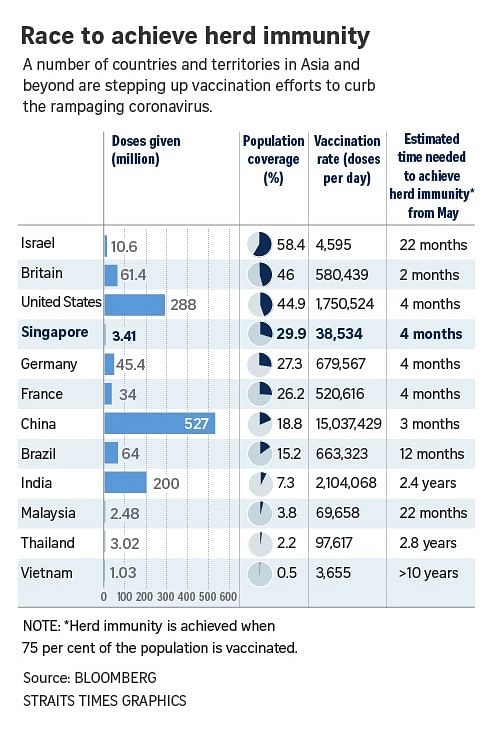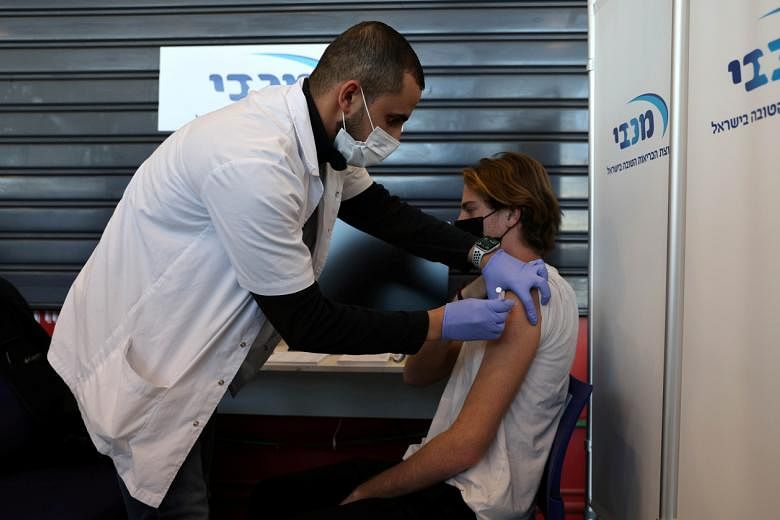SINGAPORE - The massive effort by countries worldwide to achieve herd immunity against Covid-19 by vaccinating three-quarters of their population against the disease appears to be moving in fits and starts, judging by the latest data.
Countries that initially appeared to be winning the race to inoculate their populations are set to slide down the ranks of the most successful nations in combating the coronavirus, if one is to go by Bloomberg's Covid-19 Vaccine Tracker, which estimates when they are expected to achieve herd immunity.
In contrast, countries that initially lagged behind in securing vaccine supplies and protecting their populations with jabs are now likely to overtake the erstwhile leaders, having used financial muscle to bring the precious, and scarce, formulations to their territories.
Incredibly, the number of people hesitant to get vaccinated is one reason that Israel - once seen as a bellwether in the Covid-19 fight - is falling behind now. It is estimated that Israel will take almost two years from now to achieve herd immunity.
When the Vaccine Tracker was launched in February, Israel was inoculating 135,778 people a day, and it was estimated that 75 per cent of its population would be protected against Covid-19 within two months.
But the number of people being vaccinated daily in Israel has since come down to just 4,595 a day. At this rate, it will take 22 months for herd immunity to be reached, even though 58.4 per cent of the population has already been inoculated.
Compare that with China, which in February was expected to take 5.5 years to get to the 75 per cent threshold, even though it was administering 1.03 million vaccine shots a day.
Just three months later, the country is now expected to need just another three months to achieve widespread protection against the coronavirus, thanks to a vaccination campaign that is currently seeing more than 15 million doses being administered daily.
A carrot-and-stick policy adopted by the Communist Party to incentivise vaccinations and punish recalcitrant members of the population has paid big dividends. This is despite China having the world's largest population.
On the other side of the planet, the United States, once the epicentre of the pandemic, has bounced back, thanks to a mammoth vaccination effort that saw it corner enough of the vaccines on the market to inoculate its population more than twice over.
The US, initially projected by Bloomberg to take 11 months from February to achieve herd immunity through vaccinations, now sees the threshold being crossed in four months, though it remains to be seen whether vaccine scepticism among Americans will thwart the effort to protect the nation as a whole.
India, the new coronavirus hot spot, has also made rapid strides in its vaccination campaign, with herd immunity expected to be achieved in 2.4 years at the current vaccination rate. Three months ago, it was a 10-year prediction for the country.
However, given massive contagion and soaring deaths, India needs to step up its efforts beyond the 2.1 million jabs it is giving daily now if it wants to quell the virus.
India faces a massive shortfall in the quantum of vaccines needed, but data indicates that millions of doses were earlier wasted there, with a population unconvinced of the merits of getting a shot.
Britain is notable for adhering to its timeframe for vaccination of the majority of its population. It predicted in February that it would take six months to complete its inoculation campaign, and it is now expected to reach the 75 per cent threshold within the next two months, a feather in the cap of the government.
One of the statistics mentioned in the vaccine tracker is the estimate that 75 per cent of the entire world population will be inoculated within the next 11 months, if the current rate of vaccination continues worldwide. That is an improvement from the estimate of seven years when the tracker was launched.
Given the stark disparity in vaccine distribution between rich and poor countries - with rampant hoarding of vaccines suggesting that large stocks are most probably going to go to waste - it is unclear whether this prediction will come true.



